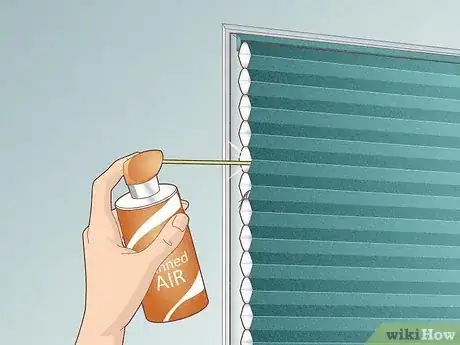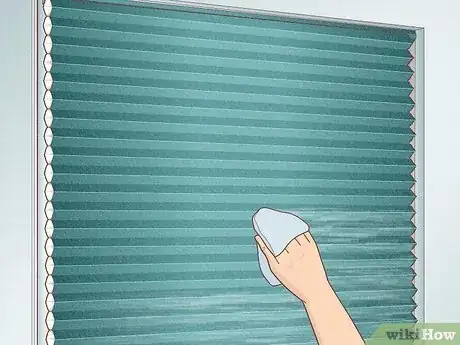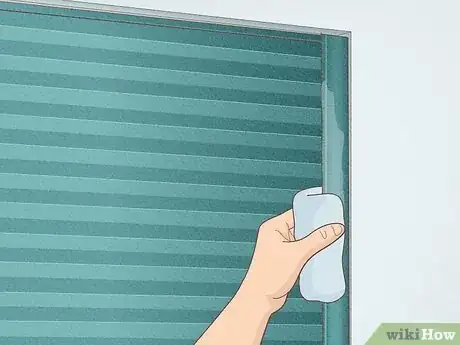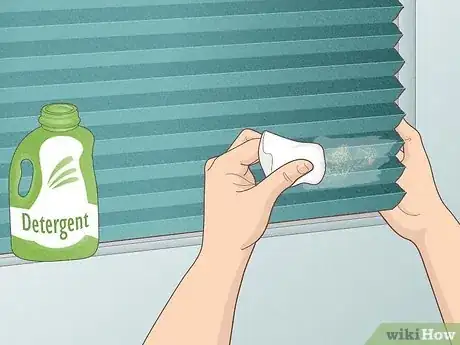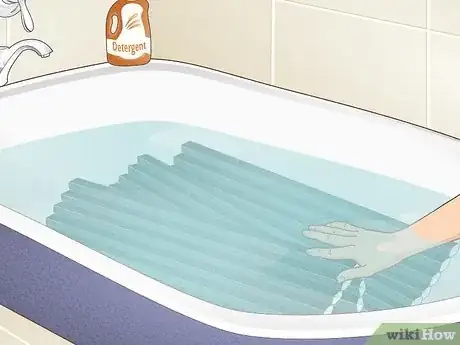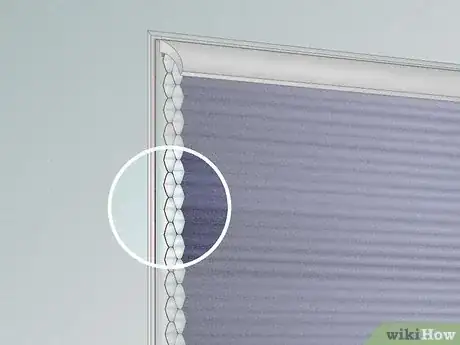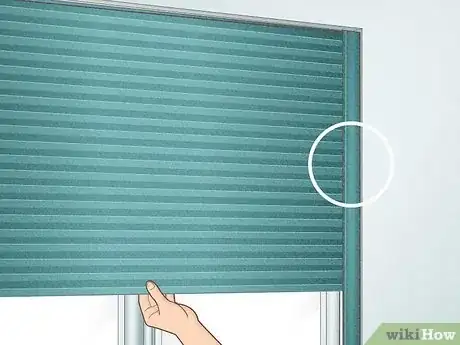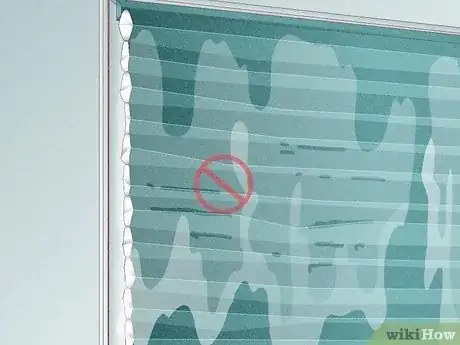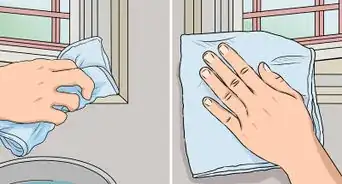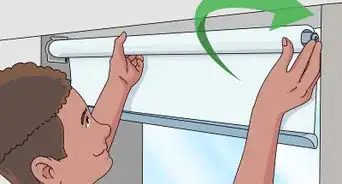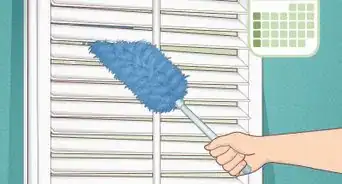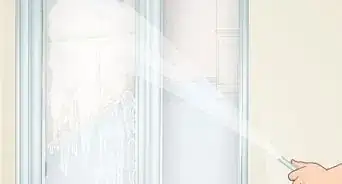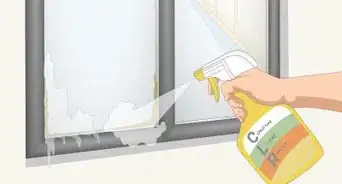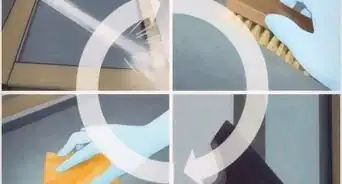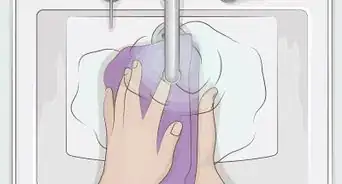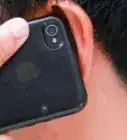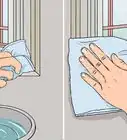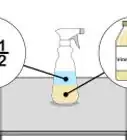This article was co-authored by Amy Mikhaiel. Amy Mikhaiel is a cleaning guru and the CEO of Amy's Angels Cleaning Inc., a residential and commercial cleaning company in Los Angeles, California. Amy's Angels was voted Best Cleaning Service by Angie’s Lists in 2018 and was the most requested cleaning company by Yelp in 2019. Amy's mission is to help women achieve their financial goals by establishing empowerment through cleaning.
This article has been viewed 82,588 times.
Sometimes called honeycomb shades, cellular shades are a window covering that blocks light while providing better insulation.[1] Cellular shades are characterized by a gap or “cell” of air between the front and back of the shade. Remove dust from your shades with compressed air and the brush attachment of a vacuum. Wash out ingrained dirt and stains with spot cleaning or a professional ultrasonic cleaning. Get the most from your shades by installing ones with improved energy saving features and prioritizing shades with tracks.
Steps
Removing Dust
-
1Clear dead insects and dust from inside cells with compressed air. Bugs may have crawled into the cells of your shade and died, accumulating there along with dust. Position the spray applicator of a can of compressed air at the mouth of a cell. Press the applicator and spray air through each cell to clear out bugs and dust.
- In some cases, this may cause dust and bugs to fly out the opposite end of the shade. You may want to lay down a drop cloth or newspaper to catch ejected matter and contain a potential mess.
- You can also spray the outer fabric of your shades with compressed air as a dusting measure. Spray each row/pleat of the fabric from top to bottom, end to end with the compressed air.[2]
- If you don’t have compressed air, you can use a blow dryer set to “Low” on “Cool.” Avoid using hot air, which can cause the glue used to make the shade to weaken.[3]
-
2Wipe shades side to side with a microfiber cloth. Alternately, you can substitute a lint roller or feather duster in place of the microfiber cloth. Apply cleaning tools to the shades in a side to side motion. Follow the direction of the pleating to prevent the fabric from becoming deformed or misshapen.[4]
- Use gentle, short strokes when wiping your shades with a cloth, duster, or lint roller. Take your time when wiping, dusting, or rolling the fabric. Too much force could deform its appearance.
- The microfiber cloth dry-wipe, feather dusting, and lint rolling are ideal cleaning measures for regular, light cleanup and dust reduction. [5]
Advertisement -
3Vacuum your shades with a brush attachment. Apply your brush attachment to the shades in the same fashion you wipe with a cloth or roll with a lint roller: side to side. Clean the shade from top to bottom to prevent yourself from accidentally knocking dust onto lower parts of the shade.[6]
- Ideally, you should only vacuum your cellular shades on the medium or low setting of your vacuum. Vacuums that are too powerful should not be used, as the suction of these can deform your shade.
- This cleaning technique works best for gently but thoroughly lifting dust and dirtiness out of the fabric of the shades. If this technique fails, you’ll likely have to wash the dirty area of your shades.
EXPERT TIPAmy Mikhaiel is a cleaning guru and the CEO of Amy's Angels Cleaning Inc., a residential and commercial cleaning company in Los Angeles, California. Amy's Angels was voted Best Cleaning Service by Angie’s Lists in 2018 and was the most requested cleaning company by Yelp in 2019. Amy's mission is to help women achieve their financial goals by establishing empowerment through cleaning.House Cleaning Professional
 Amy Mikhaiel
Amy Mikhaiel
House Cleaning ProfessionalStart cleaning your shades by spraying Febreeze. Next, steam clean the fabric with a portable hot steamer then let them dry. If there is a dirty spot or stain, try using Oxyclean first.
-
4Clean the mountings and side tracks of the shades. If your cellular shade is equipped with a track on its sides, this will have to be cleaned regularly as well. Dust, dead insects, and other grime builds up in the track over time. Use a clean rag dampened with warm water and a mild detergent, like dish soap, to wipe the tracks clean.
- Tracks that are narrow may be difficult to clean inside. Use a narrow tool, like a screwdriver, to push your rag into the track to clean it.
- Cotton swabs are usually small enough to fit easily into side tracks. Dab the cotton end of the swab into warm water mixed with liquid dish soap, then clean the track. Replace dirty swabs as necessary with fresh ones.
Washing out Ingrained Dirt and Stains
-
1Spot clean your shades with warm water and a mild detergent. Avoid using water that is too hot. Excess heat may weaken glue used to make your cellular shades. Mix lukewarm water and a mild detergent in a bucket. Gently dab dirty areas with a rag or sponge dampened in the detergent/water mix until blemishes lift.[7]
- Always test your rag and cleaner on an out of sight portion of your shades. Some rags and cleaners may discolor your shades and should not be used.
- Using too much pressure when dabbing the fabric of your shades may cause damage, like pilling.[8]
-
2Submerge shades in a bathtub for a deep cleaning. Cleaning your shades in this fashion may cause the shape of the shades to change permanently, though many cellular shades now use fabric that allows for bathtub submersion cleaning. Fill enough lukewarm water in a clean bathtub to submerge your shades fully. Add a few drops of mild detergent, like dish soap, to the water. Insert the shades in the water and swish them gently to remove entrenched dirt.
- After you have swished your shades through the soapy lukewarm water, drain the water and refill it with lukewarm water only. Swish the shades once again to cleanse them of the remaining detergent.
- Cellular shades should be air dried after being cleaned in this fashion. Hang your shades as you would normally and leave them fully open until dry.
- If your shades are very dirty, you may need to drain the tub and refill it a few times. When the water swishes clear, your shades are clean.[9]
-
3Hire a professional to ultrasonically clean your shades. A professional service will have specialized cleaning techniques, like ultrasonic cleaning, that can safely and thoroughly clean your cellular shades. Avoid dry cleaning, as this may void some cellular shade warranties.
- When you call a cleaning service, be sure you specifically ask if they are a certified blind cleaner for your particular brand of cellular shades.
- There is likely a customer service number on the instructions or in the information that came with your cellular shades. A customer service line for your shades will be able to recommend an appropriate cleaner in your area.[10]
Getting the Most from Your Shades
-
1Install improved shades for more energy saving. Cellular shades with multiple cells may provide even better insulation than the common single cell styles. Some companies include a metal core inside of cells to help the shades retain heat.
- Specialized shades may only be available through special producers or online. Search for “Energy efficient cellular shades” online to research other energy saving features.
-
2Prioritize shades with side tracks for reduced drafts. Some kinds of cellular shades are installed with tracks that run up and down the sides of your window. These form a flexible seal that cuts down on drafts. Cellular shades with tracks may cut the heat loss of your shades by half.
- The long sides of tall windows, especially, are excellent candidates for cellular shades with tracks.[11]
-
3Avoid getting the fabric of your shades wet too frequently. Many kinds of cellular shades use glue to hold its fabric in the shape of a cell. Too much exposure to water can cause the glue to weaken or dissolve.
- Even when spot cleaning your shades with a dampened rag, try to avoid wetting the part of the shade where the front and back fabric are held together by glue.
Community Q&A
-
QuestionHow do I clean cellular honeycomb blinds that are covered in mildew from over 20 years?
 Jblondie39Community AnswerUse a solution of vinegar and water and expose to bright sunlight until dry, repeat as needed to get it all out.
Jblondie39Community AnswerUse a solution of vinegar and water and expose to bright sunlight until dry, repeat as needed to get it all out.
Warning
- Cleaning your shades in a way not indicated proper in the user instructions may void the warranty of your cellular shades.
Things You'll Need
- Bucket
- Compressed air
- Microfiber cloth (or feather duster, lint roller)
- Mild detergent (like dish soap)
- Rag (clean)
- Vacuum (with brush attachment if available
References
- ↑ https://www.thisoldhouse.com/ideas/it-worth-it-honeycomb-shades
- ↑ http://www.mariak.com/images/cleaning-care/How%20to%20Clean%20Cellular%20Shades.pdf
- ↑ https://www.selectblinds.com/blog/clean-honeycomb-aka-cellular-shades/
- ↑ http://www.mariak.com/images/cleaning-care/How%20to%20Clean%20Cellular%20Shades.pdf
- ↑ https://www.selectblinds.com/blog/clean-honeycomb-aka-cellular-shades/
- ↑ https://www.blinds.com/infopage/cleaning
- ↑ https://www.blinds.com/infopage/cleaning
- ↑ https://www.blinds.com/infopage/cleaning
- ↑ http://www.mariak.com/images/cleaning-care/How%20to%20Clean%20Cellular%20Shades.pdf
About This Article
Cellular shades, which are a window covering that blocks light while providing better insulation, should be cleaned on a regular basis. To clean dust and dead insects off your shades, spray compressed air through each cell. You can also wipe your shades side to side with a microfiber cloth, lint roller, or feather duster. Another way to remove dust and debris from your shades is to vacuum them with a brush attachment, but make sure to keep your setting on low or medium to avoid deforming your shades. To spot clean your shades, mix lukewarm water with a mild detergent and gently dab dirty areas with a rag or sponge dampened with the mixture. To learn how to deep clean your cellular shades, keep reading!
